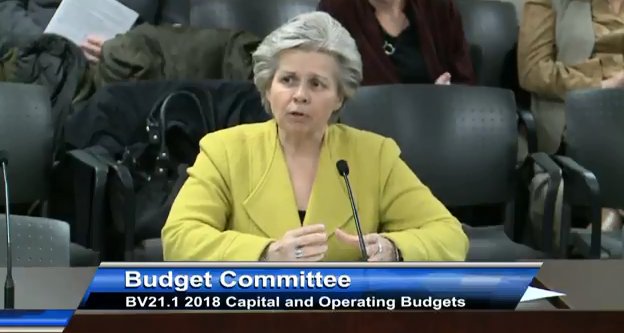Put A Gender Equity Lens On The City Budget
Speaking Notes for Colette Prevost, Director of Advocacy and Communications
January 10, 2018

Good morning:
My name is Colette Prevost, and I am the Director of Advocacy and Communications at YWCA Toronto, which is the city’s largest multi-service women’s organization.
We help women escape and recover from violence, move out of poverty, and access safe and affordable housing. We also work with young girls to build their leadership and critical thinking skills. Our Association serves over 13,700 women and girls annually. We also shelter and house almost 1,400 women and children.
I am here today to emphasize the need for a gender equity lens in budget processes and decisions – looking at all of our revenues and spending in terms of who it helps, and who it hurts, not just in terms of how much it costs. In 2016, Council adopted a motion that mandates a Gender Equity Lens in the budget process, yet here we are in 2018 without results.
Like many of the deputants today, we are concerned about growing poverty and income inequality in our city. The women who attend our programs tell us of the challenges they face accessing childcare, safe housing, nutritious food, and public transit. I will focus on the housing crisis to demonstrate why a gender responsive city budget is so desperately needed.
Access to housing and experiences of homelessness differ on the basis of gender. Women are more likely to live on low incomes, live to old age, live with children, and seek shelter due to violence. Women also face unique systemic challenges as they flee violence and attempt to secure housing. Many women are reluctant to turn to co-ed and overpopulated shelters because they are unsafe spaces. They will try to couch surf with friends, stay with family members, or may – unfortunately – return to abusive homes.
Of the women who do turn to shelters, over 50% do so with children. Children require specialized supports and living arrangements. Most co-ed shelters are not appropriate places for children, and warming centers do not respond to the needs of women and their children. Women fleeing gender-based violence cite the lack of affordable, quality housing as the number one reason why they cannot leave abusive relationships. So again, women are limited in where they can go.
As you know, YWCA Toronto operates a women’s homeless shelter, which is consistently at capacity. And as we have made clear to Council many times, the non-profit community is bearing a huge responsibility and weight for the funding for emergency shelter programs in the city. The current funding formula is insufficient and relies on someone other than government to fund what is a human right.
Gender-blind or gender-neutral decision making in the budgeting process means that the nuances of the specific needs of groups of women are lost. By not providing enough safe and adequate gender-responsive housing and shelter options, our system is leaving women and children in unsafe and precarious situations.
To end gender-based homelessness, violence, and inequality, we require a budgeting process that is centered on the needs of women. Public resources should be allocated to agreed upon strategic priorities, and achieving gender equity should be one of those priorities.
Therefore, we ask Council to take the following actions:
• Prioritize the implementation of the approved Gender Equity Lens in all budgetary decisions and processes;
• Invest in a continuum of housing options for women that include funded staff supports;
• Collect and publish data disaggregated by gender, race, immigrant status and other variables; and,
• Adopt new revenue tools to fund the strategies that Council has already approved and would positively impact the lives of women, including the Poverty Reduction Strategy.
This year’s budget does not go far enough towards remedying the disparities that women in Toronto face. What we really need is for Council to take the needs of women seriously and a strong commitment to invest.
Thank you.